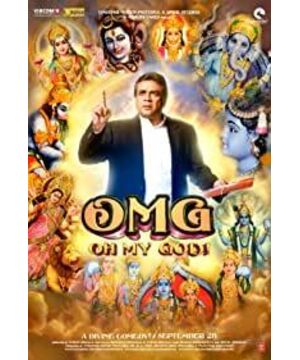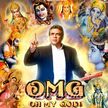Note: How many times do I have to say that this film has nothing to do with Aamir Khan? Is Aamir Khan the only Indian actor? Every time I recommend this film to others, someone always says it's Aamir Khan? I play you a ghost. Although the Chinese translation names are the same, but this is the pot of translation, can't you just listen to what people say?
I haven't seen an Indian film for several years since I watched Three Silly. I watched OMG a few days ago and felt that this film was really good. Although the main line is simple, without too many twists and turns, it is the process of the protagonist suing the gods. There are also no rich dance elements like other Indian films, but in terms of content, it is courageous.
Three idiots are talking about the ills of education in India, while OMG is talking about religious fanaticism in India. When it comes to the realm of religion, this is a topic that needs to be treated with caution. Religion is a belief, and its power is unimaginable by ordinary people. In ancient Europe, the emperor must be coronated by the bishop, which is the so-called divine right of the monarch. Moreover, Pepin's donation of soil and the establishment of the Papal State can also show that the power of religion is stronger than the imperial power. The bloody and cruel nature of religious wars such as the Crusades, and the tragic fate of people who opposed traditional religious concepts like Copernicus also reflect people's fanatical support for religion. way of punishment. It is not easy to dare to criticize religion in a place as popular as India.
In India, monkeys are much loved by Indians as the incarnation of gods. Even if the mischievous monkeys take away all the fruit from the fruit stall, the stall owner can only find a way to drive them away without hurting them. Because they are the incarnation of the gods, and the monkeys snatch the fruit, people will comfort themselves, which is the will of the gods. The mice that everyone shouted and beat have also become the worship of some temples here, and a large amount of grains and fruits are put in the temples for the mice to eat every day. The pigeons outside the temple can only pick up the food scraps of mice. But milk is something that needs to be used to bathe a stone that is regarded as a sacred object. The human rights of the poor are not as high as those of deified animals, and religious people use religion to make a fortune. All the ridiculous questions set the stage for what happens to the protagonist.
The protagonist's slaps against religious figures in the film are the biggest attraction of the whole film, and the mutual confrontation between the two sides in court is also the main line of the whole film. Different groups of people who make money around religion are full of ugliness in the film. The so-called apologetics only protect their own interests. The protagonist's series of counterattacks in court not only slapped the face, but also had a reason to fight, leaving the other party speechless. Even directly citing the religious teachings of the other party's beliefs directly ride on the face, which makes people look physically and mentally comfortable, I like it. (I suspect that the main creator was from the debate team before) Maybe it is because of the fact that he is in India, although the film is skeptical about religion, and even slanders some gods. However, it is the main god of Hinduism who helps the protagonist to reverse the situation in the film. And in the second half of the film, the protagonist's attitude towards religion has also undergone a subtle change, from disdain at the beginning to respect but disbelief. This may be a compromise of the crew to religion, but it is this kind of pertinent attitude that makes the whole film a good film about freedom of belief, respect for culture, and satirizing the issue of religious fanaticism, rather than blindly insulting religion angry youth movie. It is away from the total denial of religion, but only criticizes all kinds of malpractices in religious belief. In general, this film takes the court battle between the protagonist and the religious leader as the carrier, and satirizes the many drawbacks of Indian religion with sharp words through the protagonist's mouth. He also used the hand of the Hindu lord to express the director's respect for religion, and it is rare to achieve the purpose of ridicule while trying not to offend people.
View more about OMG: Oh My God! reviews











